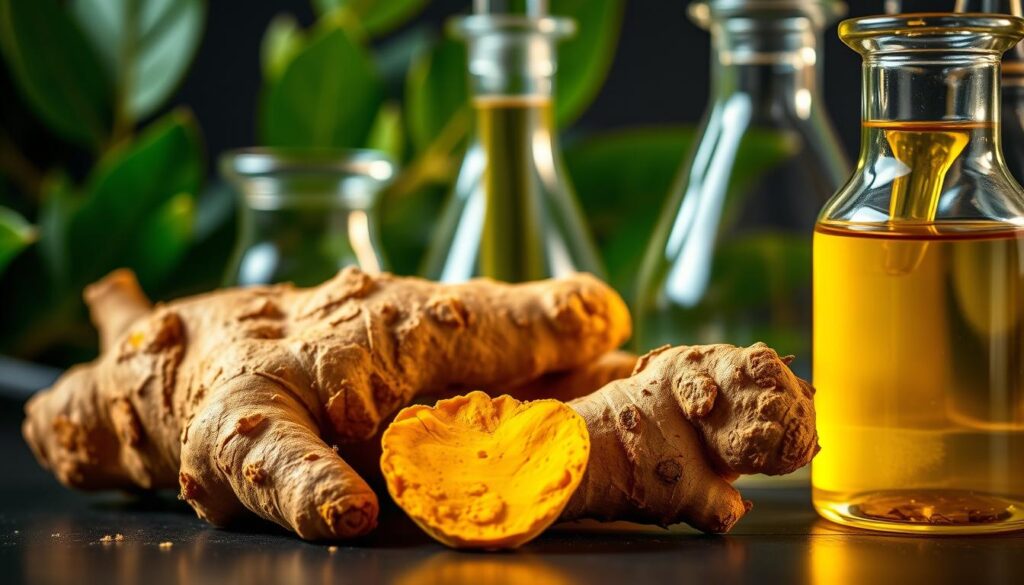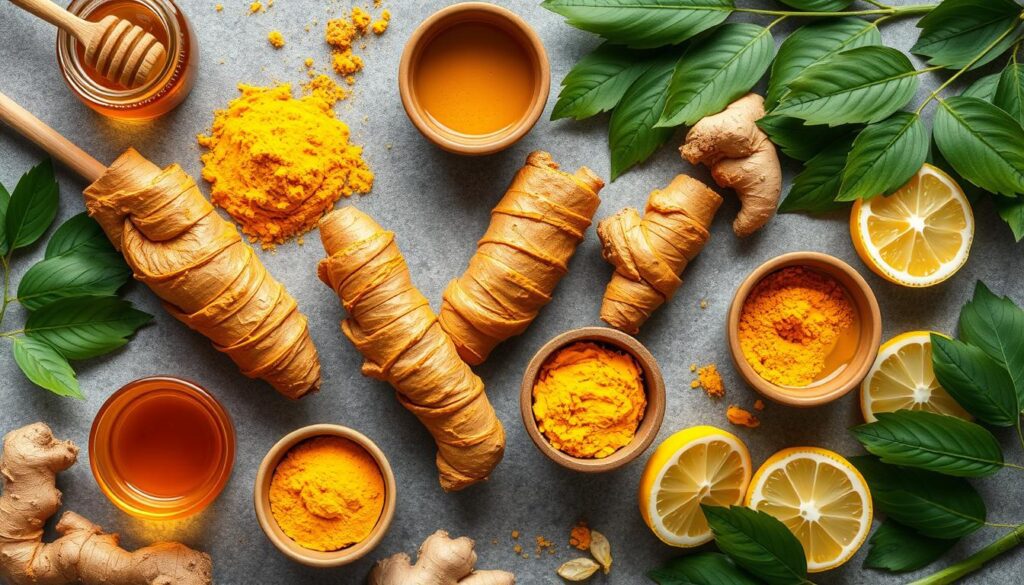Turmeric Benefits: A Powerful Spice for Health
Did you know that approximately one in three adults in the United States suffers from metabolic syndrome, a condition that significantly elevates risks for type 2 diabetes and heart disease? Amidst this health crisis, turmeric emerges as a beacon of hope thanks to its profound healing properties, primarily attributed to its key active component, curcumin. Beyond its vibrant yellow-orange hue and culinary appeal, this ancient spice has been celebrated for its extensive health benefits, particularly in promoting overall health and wellness. From its anti-inflammatory properties to its rich antioxidants, turmeric is not just a kitchen staple; it is a potent ally for those seeking to enhance their well-being.
Key Takeaways
- Turmeric is composed of about 3% curcumin, delivering numerous health benefits.
- It may help manage conditions like metabolic syndrome, arthritis, and digestive issues.
- Research indicates potential anti-inflammatory effects that could alleviate joint pain.
- Curcumin supplementation might improve PMS symptoms and even support mood enhancement.
- Always consult a healthcare provider before using turmeric supplements, especially in higher doses.
Understanding Turmeric and Curcumin
Turmeric, a vibrant yellow spice primarily sourced from the root of the Curcuma longa plant, shares a family with ginger. This spice has intrigued many due to its distinctive properties and extensive history of use. Its main bioactive compound, curcumin, constitutes about 1-6% of turmeric’s weight, leading researchers to explore the curcumin health benefits that come with this ancient natural remedy.
The Source of Turmeric
The turmeric sources mostly include the rhizomes of Curcuma longa, revered for their culinary and medicinal properties. Historically, this spice has been integral to many cultures worldwide, especially in Indian cuisine and wellness traditions. As one of the frequently utilized natural remedies, turmeric is also popular for its earthy flavor and bright hue, enhancing dishes while promoting health.
What is Curcumin?
Curcumin, the key active ingredient in turmeric, boasts remarkable antioxidant and anti-inflammatory properties. This compound is often studied for its potential health benefits, such as inhibiting chronic inflammation and promoting enhanced brain function. Despite being present in turmeric at relatively low levels, curcumin gains strength when paired with other natural substances, such as black pepper, due to piperine’s ability to significantly boost absorption.
Historical Uses in Ayurvedic Medicine
In Ayurvedic medicine, turmeric has been utilized for nearly four thousand years as a potent healing ingredient. It finds applications in treating various ailments, including digestive issues, skin health, and respiratory problems. The holistic approach of Ayurvedic practitioners emphasizes turmeric’s role in maintaining balance within the body, reinforcing its status as a timeless natural remedy.
Turmeric Benefits: A Powerful Spice for Health and Wellness
Turmeric stands out as a remarkable spice with various health benefits. Its main active ingredient, curcumin, plays a pivotal role in its antioxidant effects, which help in neutralizing free radicals that can cause oxidative stress in the body. The following sections explore the diverse benefits associated with this powerful compound.
Rich in Antioxidants
Curcumin’s antioxidant effects significantly contribute to overall health, offering protection against cellular damage. By neutralizing free radicals, it enhances the body’s defense mechanisms and contributes to improved vitality. Regular consumption may aid in reducing the risk of chronic diseases associated with oxidative stress.
Anti-Inflammatory Properties of Curcumin
The anti-inflammatory properties of curcumin make it particularly beneficial for individuals suffering from inflammatory conditions such as arthritis. Studies show that curcumin can alleviate pain and discomfort related to these conditions. It has been demonstrated to slow the progression of osteoarthritis and relieve associated symptoms, making it a natural option for managing inflammation.
Potential Effects on Mood and Cognitive Functions
Emerging research indicates that curcumin may have positive effects on mood and cognitive functions, contributing to mental wellness. Curcumin mood benefits derive from its ability to increase brain-derived neurotrophic factor (BDNF) levels, which is essential for cognitive improvements. This effect suggests a promising avenue for combating mood disorders and enhancing brain health.

The Science Behind Turmeric’s Healing Properties
The growing body of scientific research turmeric has garnered over the past decades highlights its impressive therapeutic potential. Notably, the efficacy of curcumin in various health applications has become a focal point for researchers. Many studies indicate that curcumin possesses powerful anti-inflammatory and antioxidant properties that play a critical role in chronic disease prevention.
Research Studies on Curcumin’s Efficacy
Extensive scientific research turmeric underscores its role as a natural remedy. For instance, analyses of patients with ulcerative colitis showed promising results, indicating that those taking curcumin alongside standard medication had better remission rates compared to those on medication alone. Furthermore, studies have demonstrated that curcumin may enhance memory performance in older adults, showcasing its potential benefits beyond physical health.
Curcumin’s Role in Fighting Chronic Diseases
Curcumin has emerged as a vital component in addressing various chronic diseases. Research highlights its capability to mitigate inflammation, which is a significant factor in heart disease and cancer development. Observations from studies reveal that curcumin may improve heart health by increasing endothelial function, while also exhibiting potential in curbing cancer cell growth. These insights contribute to understanding the profound health benefits of turmeric in modern medicine.

How to Incorporate Turmeric into Your Diet
Incorporating turmeric into your diet can enhance both flavor and health benefits. Start by exploring various healthy cooking ingredients that feature turmeric, making meals flavorful and nutritious. Fresh or dried turmeric can easily elevate dishes like soups, stews, and curries. Its vibrant color adds visual appeal while delivering an array of health benefits.
Healthy Cooking Ingredients Featuring Turmeric
Utilizing turmeric in cooking is simple and beneficial. Combine it with healthy cooking ingredients such as leafy greens, legumes, and whole grains to create nutrient-dense meals. For a refreshing drink, consider a golden milk recipe, which blends turmeric with milk and spices, delivering numerous health advantages.
Golden Milk Recipe for Daily Consumption
A golden milk recipe typically involves simmering a teaspoon of turmeric with milk, black pepper, and a dash of honey for sweetness. This delightful beverage can be easily prepared and enjoyed daily, making it a popular choice for those seeking to incorporate turmeric into their routine.
Creative Ways to Use Turmeric in Meals

To explore turmeric meal ideas, think outside the box. Turmeric can be added to smoothies for a nutritious boost, or mixed into baked goods for an exciting twist. Experiment with using it as a seasoning for roasted vegetables or even in salad dressings, enhancing both taste and health benefits.
Turmeric Supplements: What You Need to Know
Turmeric supplements have gained popularity due to their potential health benefits. While these supplements can be beneficial, it is crucial to understand the potential risks, especially when consumed in high doses. Users should be aware of the risks of turmeric associated with excessive intake. Some individuals may experience side effects such as stomach upset, and there is an increased risk of kidney stones for those predisposed to them. Consulting with a healthcare professional before adding these supplements to your routine is advisable.
Potential Risks of High-Dose Supplements
Taking curcumin supplements at high doses may lead to various side effects, including gastrointestinal discomfort. Turmeric’s blood-thinning properties can also present issues, potentially resulting in easier bleeding and complications during surgeries. Pregnant women are particularly advised to avoid these supplements due to these risks. The dosage should be carefully monitored to minimize potential negative effects.
Diet vs. Supplements: What’s Best?
Incorporating dietary turmeric into daily meals is generally considered safer than relying solely on high-dose turmeric supplements. Turmeric powder is commonly used in cooking, especially in Indian cuisine. When turmeric is consumed as part of a dish, its bioavailability improves, particularly when combined with black pepper, enhancing the absorption of curcumin in the body. Balancing turmeric with healthy fats, such as olive oil or avocado, can aid in maximizing its health benefits while reducing the risks associated with supplements.
Potential Health Risks and Side Effects
While turmeric is widely regarded for its potential health benefits, certain populations may face risks associated with its consumption. Understanding these health risks of turmeric is essential for safety and informed decision-making regarding its use.
Who Should Avoid Turmeric?
Individuals with specific health conditions should exercise caution. Pregnant or nursing women, people with gallbladder issues, and those on anticoagulants or blood-thinning medications may be particularly vulnerable to turmeric side effects. Moreover, individuals with liver disease, hormone-sensitive conditions, or those experiencing bleeding disorders should consult healthcare professionals before using turmeric. Supplements can be more concentrated than spices used in food, potentially heightening risks associated with excessive intake.
Possible Drug Interactions with Curcumin
Curcumin, the active component of turmeric, can interact with various medications, including blood thinners and antidiabetic drugs. Such drug interactions may amplify the effects of these prescriptions, leading to increased risks of bleeding or adverse reactions. Additionally, some formulations may contain harmful additives, like lead, affecting overall health. Therefore, it is vital for individuals to discuss any turmeric use with their doctor to identify potential curcumin warnings related to current medications.
Conclusion
In summary, the health benefits of turmeric are vast and compelling, making it a valuable addition to any wellness regimen. The key component, curcumin, showcases significant advantages, particularly in areas such as digestion, cancer prevention, and managing blood sugar levels. By reducing inflammation and oxidative stress, turmeric aids in the promotion of overall health and wellness, impacting conditions ranging from arthritis to heart disease.
As research evolves, the remarkable potential of turmeric continues to unfold. Its ability to enhance liver function, protect against viruses, and even mitigate symptoms of anxiety and depression adds to its appeal as a natural remedy. Incorporating turmeric into your daily diet can lead to considerable health improvements, encouraging a proactive approach to wellness.
However, it is essential to use turmeric wisely, understanding both its benefits and potential risks. A balanced approach ensures that individuals can fully reap the turmeric health benefits while being aware of any side effects related to high doses, particularly for certain populations. In doing so, turmeric and its curcumin advantages can become vital components in achieving a healthier lifestyle.











